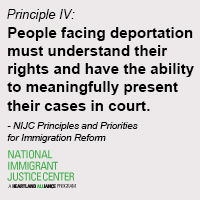Rethink Immigration is a new blog series in which National Immigrant Justice Center (NIJC) staff, clients, and volunteers share their unique perspectives and specific recommendations on what Congress and the Obama administration must include in comprehensive immigration reform to create an inclusive, fair, and humane immigration system. We hope to show the profound impact that our country’s complex and outdated immigration laws and decades of draconian enforcement have had on everyone in our society. Click here to read more about NIJC’s principles and priorities for immigration reform.
Americans have long prided our country as a safe haven for people targeted for persecution in their homelands. Since 1980, our asylum laws have allowed thousands of people to find safety and hope, and to flourish as members of our society. But a provision added to the law in 1996, which requires that people apply for asylum within one year of their arrival in the United States, has resulted in hundreds of people being denied protection solely based on a technicality.
Through NIJC’s Asylum Project and LGBT Immigrant Rights Initiative, we and our team of fantastic pro bono attorneys have represented thousands of asylum seekers. Our clients hail from more than 90 nations and their stories are as diverse as their countries of origin. Once these individuals decide to seek refugee protection from within the United States, though, their paths converge as they are thrust into the extraordinarily complex immigration system.
Even without the problem of the one-year deadline, winning asylum is not easy. People must (1) prove that they are refugees (a legal term with about five sub-parts), (2) establish that they are not subject to various additional legal bars, and (3) corroborate their entire claim with both subjective and objective evidence. The one-year deadline is one of the most challenging legal bars people face. If they do not apply for protection within a year of their arrival, they must show why one of two exceptions for changed or extraordinary circumstances (which also have multiple sub-parts) should excuse a late filing. In the years since the one-year deadline rule was implemented, it has been an insurmountable barrier for deserving applicants who have a genuine fear of persecution.
Take, for example, Eduardo,* a former NIJC client from Guatemala who fled to the United States after a gang targeted his family for cooperating in a police investigation of a gang murder. He wasn’t the first in his family to flee; his siblings and their families also came to the United States because they had been targeted for the same reason. Eduardo’s family members received asylum on the first try but Eduardo did not. The reason the officer gave for denying his case was that Eduardo couldn’t prove that he satisfied the one-year filing deadline. Like many asylum applicants, Eduardo entered the United States without a visa, so even though he did file his application within his first year in the country, the officer concluded that he didn’t have enough documentation to prove it. A judge eventually reversed this decision, noting the illogical discrepancy between the initial decision in Eduardo’s case and that of his siblings, but it took three years in the immigration system to get that resolution.
In many cases it is simply unrealistic to expect people to complete a complicated immigration application within 12 months of their arrival. Some, like our client Patrick,* are unable to file for asylum in that first year because they are coping with the trauma they endured in their home countries and confusion surrounding the immigration system. Patrick is a Rwandan man who was a child during the 1994 genocide. When he was not even 10 years old, he watched as many of his family members were murdered. Years later, he testified against the genocidaires and then came to the United States for college. About two and a half years into his college program, Patrick learned that one of the men who had murdered his family during the genocide had been released and had killed another family member, who had been paying for Patrick’s education. This death revived emotions that Patrick had been dealing with for years and made him uncertain of his own future. While coping with this death, Patrick realized that he would no longer be able to finance his education and remain safely in the United States through a student visa, so he applied for asylum. He turned in his application about nine months after he learned that his family member had been murdered. Patrick acknowledged that he did not apply for asylum within one year of entering the country but instead contended that he was covered by the exceptions to the filing deadline and that he applied within a reasonable time of the changes in his circumstances. The Asylum Office recognized that Patrick was entitled to an exception to the deadline, but decided that the nine months it took him to file after learning of the tragedy was unreasonably long. Like Eduardo, Patrick will get a second chance to make his argument, but he will have to wait about three years -- his hearing is set for 2015.
Some of our clients miss the filing deadline because they don’t understand that the law applies to them. Aissatou is  a good example. She came to the United States from Guinea to attend school. About six years later, she began receiving letters and calls from her uncle threatening to harm her if she did not return home and submit to the marriage he had arranged. Although Aissatou was terrified to return to Guinea, she did not realize that women could seek asylum based on fears of a forced marriage. Aissatou’s misunderstanding is not surprising given that asylum has historically been referred to as “political asylum,” giving the impression that only people who fear harm based on their political affiliations can qualify. This misnomer leads whole groups of refugees, like women who fear gender violence and individuals who fear harm based on their sexual orientation, to miss the deadline.
a good example. She came to the United States from Guinea to attend school. About six years later, she began receiving letters and calls from her uncle threatening to harm her if she did not return home and submit to the marriage he had arranged. Although Aissatou was terrified to return to Guinea, she did not realize that women could seek asylum based on fears of a forced marriage. Aissatou’s misunderstanding is not surprising given that asylum has historically been referred to as “political asylum,” giving the impression that only people who fear harm based on their political affiliations can qualify. This misnomer leads whole groups of refugees, like women who fear gender violence and individuals who fear harm based on their sexual orientation, to miss the deadline.
Other clients, like Miguel,* struggle to come to terms with the reason they fear returning to their home country and therefore are unable to file for asylum until years after they enter. Miguel is a gay man who was repeatedly abused and raped in Mexico because of his sexual orientation. He spent years struggling to accept himself as a gay man and to reconcile his identity with his religious and cultural upbringing. It wasn’t until his immigration status forced him to acknowledge the reasons he feared returning to Mexico that he was able to gather the courage and apply for asylum based on his sexual orientation. Although a judge recognized the circumstances that had prevented Miguel from filing for asylum within one year and granted him asylum, the government appealed, specifically challenging the judge’s decision on the filing deadline. Fortunately, the judge’s decision was upheld, but Miguel was detained in immigration custody for five additional months, and at significant cost to the government, during the appellate process.
The one-year deadline has prevented thousands of bona fide asylum seekers – men and women who otherwise established they would be persecuted in their home country – from obtaining full protection in the United States. Not only does this rule unfairly prejudice these deserving applicants, but the legal questions it creates complicate the adjudication process, causing a substantial waste of government resources. Even the Department of Homeland Security has acknowledged that the one-year deadline is ineffective as a fraud deterrent, which was initially its intended purpose. Because of the fundamental unfairness that stems from this rule, it should be eliminated as part of any comprehensive immigration reform. Our nation’s commitment to asylum seekers and refugees demands that we eliminate this bar so that bona fide refugees can obtain safety and security in the United States.
*Names have been changed to protect clients’ privacy
Ashley Huebner supervises NIJC’s Asylum Project and Keren Zwick supervises NIJC’s LGBT Immigrant Rights Initiative.
Rethink Immigration is a blog series in which National Immigrant Justice Center staff, clients, and volunteers share their unique perspectives and specific recommendations on what Congress and the Obama administration must include in comprehensive immigration reform to create an inclusive, fair, and humane immigration system.

